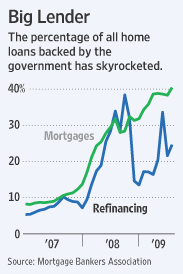John Fund interviews former GAO director David Walker:
David Walker sounds like a modern-day Paul Revere as he warns about the country's perilous future. "We suffer from a fiscal cancer," he tells a meeting of the National Taxpayers Union, the nation's oldest anti-tax lobby. "Our off balance sheet obligations associated with Social Security and Medicare put us in a $56 trillion financial hole—and that's before the recession was officially declared last year. America now owes more than Americans are worth—and the gap is growing!" . . .
"We have four deficits: a budget deficit, a savings deficit, a value-of-the-dollar deficit and a leadership deficit," he tells one group. "We are treating the symptoms of those deficits, but not the disease."
Mr. Walker identifies the disease as having a basic cause: "Washington is totally out of touch and out of control," he sighs. "There is political courage there, but there is far more political careerism and people dodging real solutions." He identifies entrenched incumbency as a real obstacle to change. "Members of Congress ensure they have gerrymandered seats where they pick the voters rather than the voters picking them and then they pass out money to special interests who then make sure they have so much money that no one can easily challenge them," he laments. He believes gerrymandering should be curbed and term limits imposed if for no other reason than to inject some new blood into the system. . . .
What kind of reforms would Mr. Walker hope the commission would endorse? He suggests giving presidents the power to make line-item cuts in budgets that would then require a majority vote in Congress to override. He would also want private-sector accounting standards extended to pensions, health programs and environmental costs. "Social Security reform is a layup, much easier than Medicare," he told me. He believes gradual increases in the retirement age, a modest change in cost-of-living payments and raising the cap on income subject to payroll taxes would solve its long-term problems.
Medicare is a much bigger challenge, exacerbated by the addition of a drug entitlement component in 2003, pushed through a Republican Congress by the Bush administration. "The true costs of that were hidden from both Congress and the people," Mr. Walker says sternly. "The real liability is some $8 trillion."
That brings us to the issue of taxes. Wouldn't any "grand bargain" involve significant tax increases that would only hurt the ability of the economy to grow? "Taxes are going up, for reasons of math, demographics and the fact that elements of the population that want more government are more politically active," he insists. "The key will be to have tax reform that simplifies the system and keeps marginal rates as low as possible. The longer people resist addressing both sides of the fiscal equation the deeper the hole will get."
Related Posts (on one page):
- Could a Government Regulator of Systemic Risk Avoid the Next Economic Meltdown?--
- FHA Adopts Countrywide's Business Model and It's Not Working . . . Again.--
- Former GAO Head Warns of Impending Deficits.--
